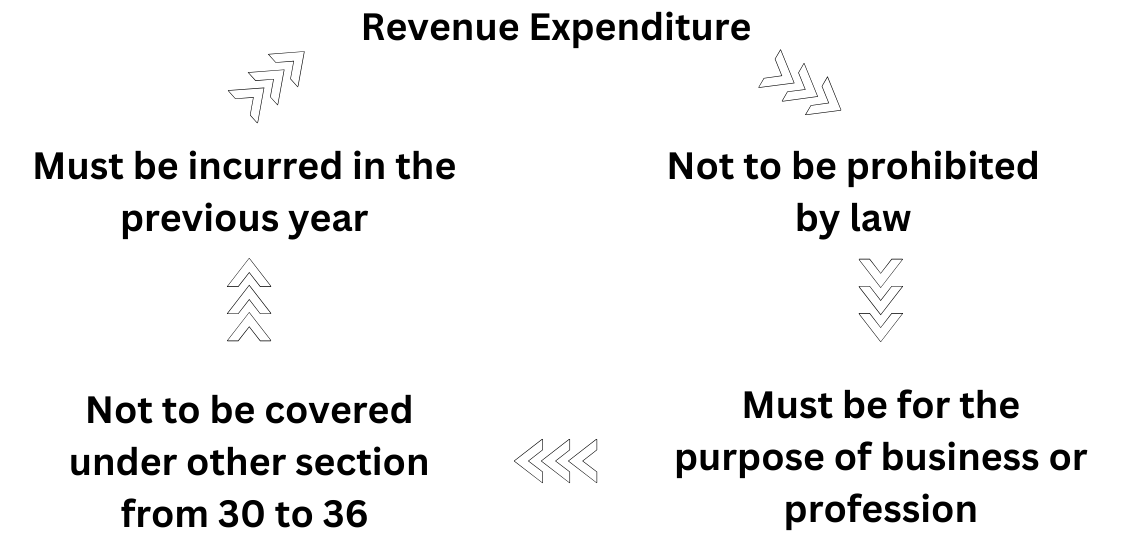
Understanding the details of Section 37 of the Income Tax Act is critical for businesses. This section provides several general deductions for expenses incurred in the course of operating a business or professional, office rent to staff salaries, Section 37 provides a framework for businesses to maximize their deductions, ultimately contributing to their financial well-being. In this blog, we’ll unravel the parts of Section 37, exploring its key aspects and how businesses can leverage it to their advantage.
|
Table of Contents |
Expenditure allowability
The allowability of Expenditure can be demonstrated with the below diagram.

What are the conditions for the allowability of the expenses?
Below are the conditions that need to be fulfilled for the allowability of expenses:
- The expenditure which is incurred should not be covered under sections 30 to 36.
- The expenditure which is incurred should be only for business or profession.
- The expenditure incurred should be revenue in nature and not capital.
- It should have been made in the previous year.
- The expenditure incurred must be enforceable by the law and should not be prohibited by any law.
What are the expenses allowed under section 37?
Following are the expenses allowed under Section 37:
- Advertisement expenses: The cost of advertising or marketing the products or services in any media for the business and profession. However, the expense incurred for advertising political parties is not allowed.
- Legal expenses: Fees paid to lawyers, solicitors, advocates, etc for obtaining legal advice or services related to business or profession. However, any expenditure that is an offence or prohibited by law is not allowed as a deduction u/s 37(1).
- Interest on borrowed capital: Interest paid on loans taken for your business or profession as a deduction from income. However, the loan must be used for business purposes only and not for personal or capital expenditure.
- Premium paid on Keyman Insurance policy: Premium on the Keyman Insurance policy of the partner is also wholly and exclusively for business and is allowable as business expenditure.
- Cost of production of abandoned Films: The cost of production of the film is governed by rule 9A however in the case of abandoned films certain expenses are to be treated as capital or not allowed due to non-receipt of certificate. Hence decision given by the Hon’ble Bombay High Court dated 28.01.2015 in ITA 310 of 2013 in the case of Venus Records and Tapes Pvt. Ltd that Rule 9A Does not apply to abandoned films and the expenses are incurred not to be treated as capital in nature and should be considered as revenue expenditure. It should be part of section 37.
- Telephone Expenses: Expenses for telephone connection
- Welfare Expenses: Welfare expenses for employees and expenses on mahurat, Diwali puja etc.
- Fees: Fees paid to the Registrar of the company for legal obligation which is revenue expenditure by nature.
- Bonus: Bonus and gift should not be considered as part of perquisite that are awarded to employees
- Loan Raising Expenditure: If the costs of obtaining loans for the business or profession are permitted to be deducted. Section 37 permits the inclusion of any legal fees associated with obtaining loans, including charges like brokerage fees, stamp fees, and registration fees.
What are the expenses not allowed under section 37 of the Income Tax Act, 1961
- CSR Expenditure: The Corporate Social Responsibility expenditure incurred by the assessor about the provision of Section 135 of the Companies Act 2013 shall not be allowable. In addition to this expenditure incurred about CSR will also not be allowable under section 37.
- Expenses prohibited by any law: The expenses incurred by the assessee will not be treated as allowable expenditures. For Example, the freebies provided by Pharma companies to medical practitioners violate Indian Medical Council (Professional Conduct, Etiquette and Ethics) Regulations. Hence such expenditure is considered to be expenses prohibited by the law and not allowed for the Pharma Company or other assessee which has provided such freebies.
- Expenditure incurred by a company for shifting its registered office from one place to another. This is not an allowable expenditure as it is not for the business or profession but for administrative convenience.
- Expenditure incurred for demolishing a building to construct a hotel on the same site. This is a capital expenditure as it results in the creation of a new asset.
- Interest paid for non-payment, less payment, delayed payment, or deferment of advance tax. This is not an allowable expenditure as it is neither business expenditure nor an income tax.
- Fee paid to the Registrar of Companies for increasing the authorized capital of a company. This is also a capital expenditure as it enhances the company’s borrowing capacity and financial status.
- Fees paid to the Registrar of Companies for changing a company’s Memorandum of Association and Articles of Association. This is a capital expenditure as it alters the constitution and rights of the company.
- Bank guarantee commission paid for securing a loan for acquiring a fixed asset. This is a capital expenditure as it is incidental to acquiring an asset.
- Penalty paid for violating or infringing any law or regulation. This is not an allowable expenditure as it is against public policy and morality.
Conclusion
In conclusion, Section 37 stands as a valuable tool for businesses and professionals, offering a means to optimize their financial strategies. By understanding this section, businesses can make informed decisions, capitalize on eligible deductions, and enhance their overall profitability. It’s not just about saving on taxes; it’s about making strategic financial moves that lead to long-term success.


